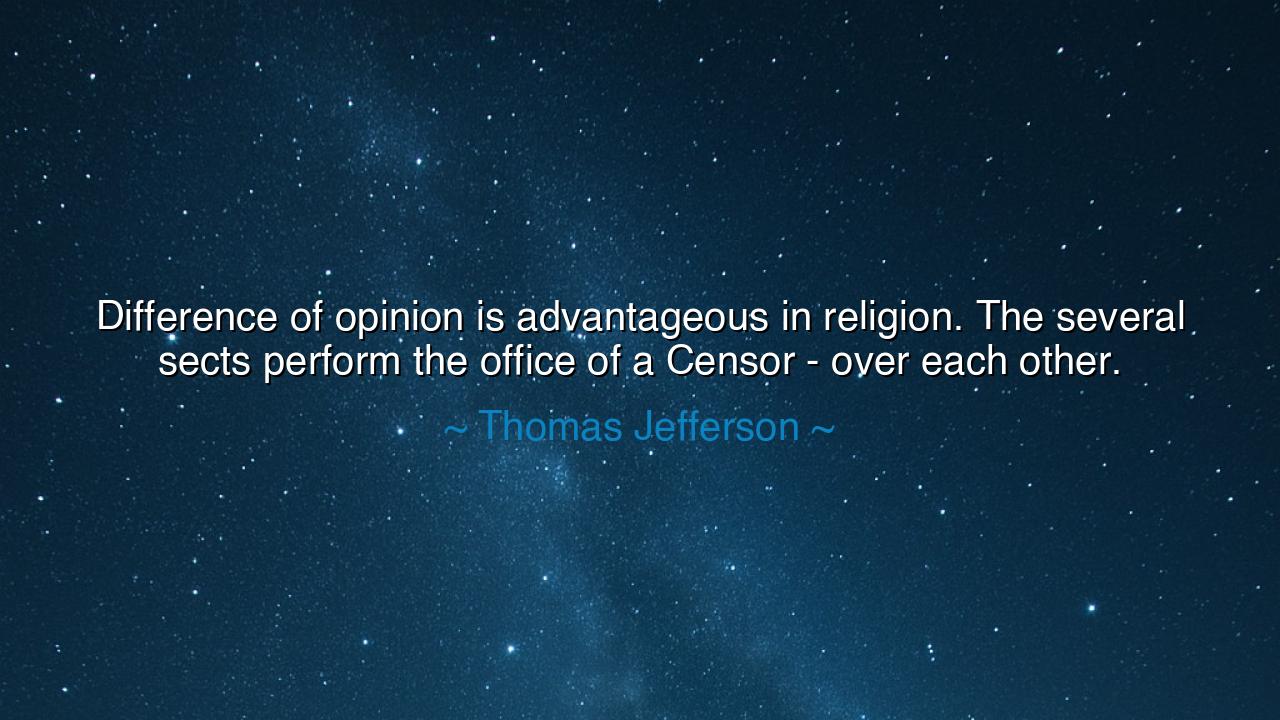
Difference of opinion is advantageous in religion. The several
Difference of opinion is advantageous in religion. The several sects perform the office of a Censor - over each other.






Difference of opinion is a force of nature, one that stirs the hearts and minds of humankind, giving shape to the ever-shifting tides of history. When Thomas Jefferson, the venerable architect of a new world, spoke of difference of opinion in religion, he illuminated a truth that transcends time and space. In his wisdom, Jefferson understood that the clash of beliefs is not a source of division but rather an instrument of enlightenment. Like the chisel that strikes the stone, each blow sharpens the form of a better understanding. It is through the contrast of views that wisdom is forged, and the strength of truth emerges from the fires of debate.
Indeed, the religious sects, as Jefferson observed, act as censors over one another, not with the intent to harm, but to elevate the collective spirit of mankind. Like the opposing forces of nature—light and dark, fire and water—each sect serves to check the excesses of the other, ensuring that no single doctrine or belief holds dominion over the minds of all. Through the interplay of differing views, people are compelled to question, to reflect, and to seek the deeper truths that lie beyond the surface of doctrine. It is in the friction of opposing thoughts that the diamond of understanding is carved from the rough stone of ignorance.
Consider the great philosophers of old, whose debates and differences of opinion shaped the foundations of our civilizations. Socrates stood before the people of Athens, challenging them to question everything—from their beliefs in the gods to their notions of justice. His method of dialogue and debate did not aim to create enmity, but to awaken the minds of men to a higher purpose. He would ask, “What is justice?” and the citizens, stirred by the heat of his questioning, would find themselves drawn into the pursuit of truth. Through these debates, no one side ever dominated; rather, they served to balance each other, pushing humanity toward a deeper understanding of the nature of virtue and existence.
In history, this interplay of differing religious opinions has been equally potent. Take the early days of the Reformation, when Martin Luther challenged the Catholic Church by nailing his 95 Theses to the church door. His protest did not immediately lead to unity; rather, it led to the splintering of Christianity into a multitude of factions. Yet, this division was not the end, but the beginning of a new era where ideas about salvation, the role of the church, and the nature of faith were debated and reshaped. It was through this conflict of ideologies that new perspectives on faith and freedom were born, altering the course of history for generations.
The lesson of Jefferson’s words is clear. It is not the absence of dissenting opinions that leads to growth, but rather their presence. Difference of opinion should not be feared, for it is through this very difference that we are compelled to examine our beliefs, to refine them, and to understand them more deeply. Like the sharpening of an axe, the friction of opposing ideas may feel uncomfortable at times, but it serves the purpose of making the blade more precise and effective in its task.
Thus, let us embrace debate and disagreement in all their forms, for they are not threats but opportunities. When we encounter those whose beliefs differ from our own, let us not respond with scorn, but with curiosity and a willingness to engage in the dialogue that has served humanity for millennia. Let us stand as Jefferson suggested, not in fear of the differences, but in the understanding that through them, we find our path toward a more enlightened world.
In the end, the censorship that Jefferson speaks of is not the suppression of thought, but the refinement of it. Each belief system, each sect, serves as a mirror to the others, reflecting back the imperfections and encouraging all who look into it to correct their course. It is through this eternal dance of divergent beliefs that we are able to grow, to learn, and ultimately to come closer to understanding the eternal truths that unite us all.






AAdministratorAdministrator
Welcome, honored guests. Please leave a comment, we will respond soon